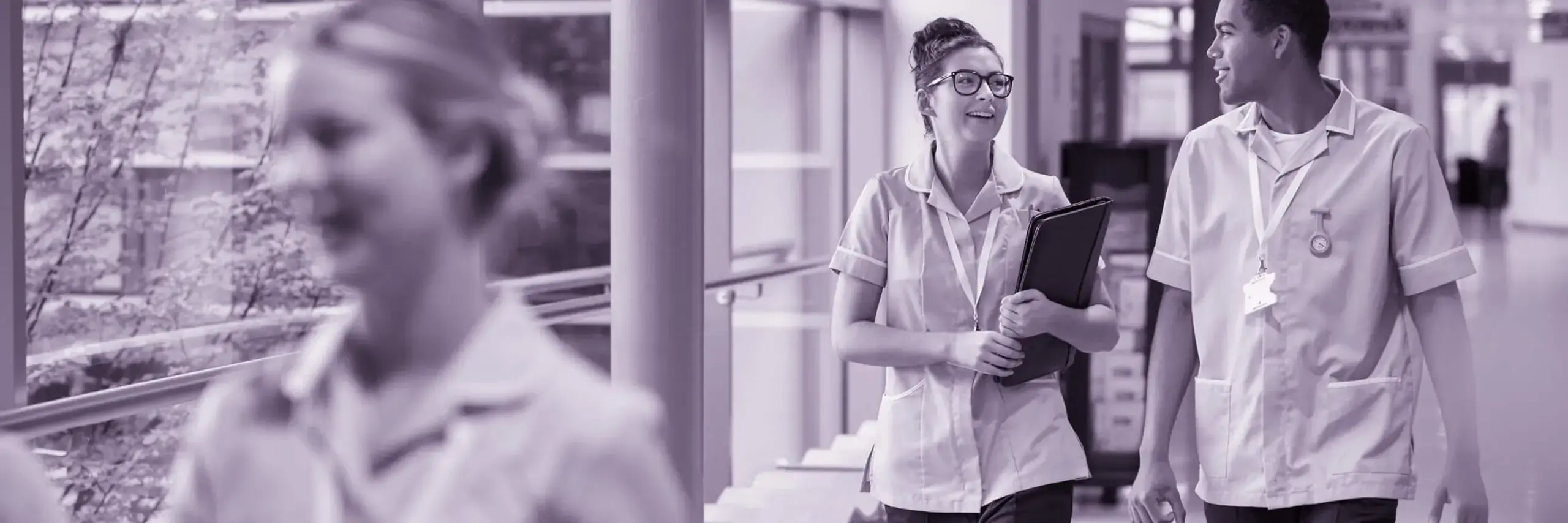Main content
A vision for an anti-racist NHS
17 Jan 2023
Our report Safer care for all launched at a Parliamentary reception on 6 September. It highlights some of the biggest challenges affecting the quality and safety of health and social care across the UK today.
We want Safer care for all to start a debate on the issues we highlight and the recommendations we have put forward in the report. As part of this debate, we are publishing a series of guest blogs written by stakeholders from across the sector. This blog is from Indranil Chakravorty, Chair of the Bapio Institute for Health Research, an arms-length body of the British Association of Physicians of Indian Origin.
Background
Just over a century after the Spanish flu of 1918, which killed circa 50 million people, the world has not faced worse devastation than the COVID-19 pandemic, which has caused nearly 7 million deaths directly and immeasurable catastrophe to the socioeconomic fabric of society. While there were many positives, such as rapid digital connectivity, collaboration in science and technology across borders and a revolution in the speed and effectiveness of vaccine development and therapeutic advances, there were many unhappy revelations. Citizens worldwide quickly realised the contribution of healthcare professionals (HCPs) who faced the pandemic at a high cost to themselves and their families, many paying the ultimate price for their dedication to their profession.
Inequalities
The COVID-19 pandemic has exposed deep, ingrained societal inequalities and variable outcomes for patients and healthcare staff. It also exposed the chronic underfunding of healthcare in most countries, the often hostile and uncivil environment that HCPs work and train in and the challenges of recruiting, training and retaining staff. There is a global migration of HCPs from high-population, resource-poor countries to those with higher GDPs, better remuneration and higher per capita investment in population health. Yet, this traditional pathway of HCP migration lets the high cost to the public purse of healthcare education be borne ironically by resource-poor countries. The World Health Organisation has encouraged such net receivers of trained HCPs to sign up for ‘ethical migration’ policies to prevent the adverse impact of such emigration to the populations of resource-poor countries. In addition, the HCPs usually are minorities in their adopted countries or healthcare systems. The UK and its National Health Service have benefited from the contribution of international healthcare professionals from before its inception. Over the last seven decades of its existence, almost a third of the trained HCPs have been trained overseas. More international medical graduates have registered with the regulator in recent years than UK-trained ones. The UK healthcare system and most net-positive HCP migration countries depend on international HCPs for safe and effective care delivery to their citizens. Yet, the international HCPs and minorities are exposed to significant bias and exclusion at work, socio-economic discrimination, oppression and racism. Many are unfairly treated in career progression, excluded from non-mandatory career development and leadership opportunities. HCPs from minority backgrounds are much more likely to be reported to the regulator, investigated for professional misdemeanours and handed out disproportionately harsher punitive decisions. This leads to physical and mental health consequences, burnout, and dropout from the workforce. There are adverse consequences for patients under the care of teams where HCPs are themselves experiencing incivility, bias and discrimination.
BAPIO
The British Association of Physicians of Indian Origin (BAPIO) was founded in 1996 to address inequalities, support international HCPs and work towards excellence in healthcare delivery in the UK. In its quarter-century of existence, BAPIO has had many achievements in addressing inequalities, the principal among them being the legal challenge to the Royal College of General Practitioners (2014) on differential success rates for candidates from minority ethnic backgrounds in the clinical examination, the change of visa rules and access to training for international medical graduates (2008) and more recently, the work undertaken in tackling differential attainment by its arms-length research institute in 2021 - the Bridging the Gap project (BTG21).
In the BTG21 project, Bapio Institute for Health Research (BIHR) undertook a systematic synthesis of evidence for differential attainment across the entire life cycle of the medical profession. The series of workshops built consensus with experts, stakeholders, grassroots organisations and individuals on the interventions that would lead to effective change in the status quo of differential attainment (DA) for HCPs from minority ethnic backgrounds and with protected characteristics.
In tackling DA in recruitment and career progression, the BTG21 consensus recommended several actions for stakeholder organisations, including:
- Recognising the demonstrable economic benefits of diversity in the workforce,
- Celebrating the contribution of international HCPs, the skills and experience they bring from their home countries and different healthcare systems
- Implement and resource a comprehensive induction and support package for all IMGs (and for other professionals)
- Removing structural bias by
○ Decolonising the medical curriculum and assessments (i.e. SJTs)
○ Widening participation in healthcare careers through initiatives in every higher education institution, reaching into schools and communities which are traditionally under-represented
○ Affirmative actions such as removing subject prerequisites which perpetuate the DA at entry, but also subsequent applications such as research funding/career choice; providing access to foundation courses for those without previous attainment in traditional STEM subjects; providing a proportionate balance of access to applicants from state or public schools and IMGs
○ Breaking geographical disparities in access by targeting areas with multiple deprivations or low participation in higher education or research funding
○ Balancing economic disadvantage by providing bursaries in school and through higher education, access to apprenticeship medical courses, removing the advantage for intercalated diplomas/ degrees as essential criteria, and providing resources to pursue early career academic/research opportunities for talented individuals
○ Removing the structural disadvantage for IMGs in summative assessments by – decolonising curricula, rationalising the requirement for high levels of English proficiency, supporting with preparatory courses in clinical communication, consultation skills and guided understanding of prevailing legal, cultural and ethical norms.
- Work to remove differences between career doctors (with a national training number) and non-career doctors (Trust doctors or locally employed doctors), a 2-tier training and employment system and thus unify nomenclature as a postgraduate doctor in the national or local training scheme.
○ Agree on a national job description, recruitment process and support for all doctors, including national employment and supervision for Locally employed doctors (LED) and SAS doctors.
- Remove barriers and widen participation at various entry points – specific required traditional criteria and interview questions used to rank an applicant may have little bearing on being a good doctor or researcher. They may reflect a need for more opportunities and access to resources rather than ability or talent. Identify people with talent and foster/nurture them into aspiring roles.
- Review, measure and report all assessment processes' equality and diversity impact.
○ Undertake root and branch reform of established content, curricula and assessment processes to take into account EDI with a diverse, representative panel
○ Rethink processes which consistently fail to achieve equality and diversity – multiple, multi-dimensional, low-stakes summative assessments undertaken in real-life workplaces, supported by adequate training, resources and time to train assessors
○ Use formative assessment and structured, meaningful feedback; make holistic progression decisions based on a 360-degree assessment of knowledge, behaviour, and skills collated and triangulated from multiple sources at ARCPs.
○ Share responsibility and accountability with supervisors, training program directors and learners to ensure that appropriately defined standards for success/ progression are met.
For many years, the focus of organisations and well-meaning members of healthcare leaders has been focused on a ‘deficit model’, therefore developing supportive interventions to bring the disadvantaged HCPs to meet the expected standards and promoting acculturation. These policies and processes have inadvertently created dissonance among the affected HCPs and an imperceptible change in the DA that exists in every HCPs journey. The BTG21 approach has been radically different and recognised that the societal bias reflected in institutional discrimination could not be solved by adopting small interventions to support the oppressed/disadvantaged. Therefore, the BTG21 review has recommended systemic change and measures that address the issue’s root cause. Our recommendations are aimed at changing policy at the organisational and national levels. Ultimately, organisations and their leaders must recognise, acknowledge and lead the change. They must be held accountable and comprehensive datasets must be collected, analysed and presented annually. We are working with project evaluation teams to develop self-assessment analytical tools for organisations and a national benchmark, which will enhance the results from Staff surveys and Workforce Race Equality Standards.
There are the early winds of change appearing. The regulator for doctors (General Medical Council), nurses (Nursing & Midwifery Council) and General Pharmaceutical Council recognise the lack of equality and diversity in their processes (e.g. refreshing of the Good Medical Practice guidance by GMC UK) and are collecting and presenting data to be transparent, offering external reviews of its decisions and pledging to achieve fairness for all. Academic institutions are opening their books to external scrutiny (i.e. Royal College of Surgeons of England commissioned Dame Helena Kennedy to review discrimination in its processes) and reviewing curricula, the equality and diversity impact of its assessment/ outcomes. At a national level, the UK NHS has pledged through its people plan to provide a level playing field, recognise the diversity of its staff and publish the equality of access to career progression to senior roles, pay parity, tackling incivility in the workplace and considering a review of its complaints, whistleblowing and investigation processes.
Ultimately, unless NHS England, UK Health boards, the UK Department of Health and Social Care and the UK PMO undertake an anti-racist, anti-discrimination policy, the Equality Act of 2010's provisions will not be realised. BAPIO and its allies in the Alliance for Equality for Healthcare Professions will need to continue to work collaboratively with the government and stakeholders in developing standards, building consensus and evaluating the effectiveness of interventions undertaken.
Find out more
Read our full report Safer care for all - solutions from professional regulation and beyond or through chapter 1 - No more excuses - tackling inequalities. There are also shorter versions available, including the executive summary, you can download these versions here.
Find out more about BAPIO here and the Bapio Institute for Health Research here.



